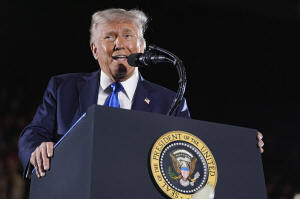The White House seeks sharp spending cuts in Trump's 2026 budget plan
[May 03, 2025]
By LISA MASCARO and JOSH BOAK
WASHINGTON (AP) — The White House released President Donald Trump's 2026
budget proposal Friday, hoping to slash, if not zero out, spending on
many government programs. It seeks a sweeping restructuring of the
nation’s domestic priorities, reflective of the president’s first 100
days in office and sudden firing of federal workers.
Trump's plan aims for steep cuts to child care, disease research,
renewable energy and peacekeeping abroad, many already underway through
Elon Musk’s Department of Government Efficiency, all while pumping up
billions for the administration's mass deportation agenda.
The budget drafters echo Trump’s promises to end “woke programs,”
including preschool grants to states with diversity programs. And they
reflect his vow to stop the “weaponization of government” by slashing
the Internal Revenue Service, even as critics accuse him of using the
levers of power to punish people and institutions he disfavors
Overall, it’s a sizable reduction in domestic accounts — some $163
billion, or 22.6% below current year spending, the White House said.
At the same time, the White House said it is relying on Congress to
unleash $375 billion in new money for for the Homeland Security and
Defense departments as part of Trump’s “big, beautiful bill” of tax cuts
and spending reductions. His goal is to repel when he calls a “foreign
invasion," though migrant arrivals to the U.S. are at all-time lows.
House Speaker Mike Johnson welcomed the proposal as “a bold blueprint
that reflects the values of hardworking Americans and the commitment to
American strength and prosperity.”

Budgets do not become law, but serve as a touchstone for the coming
fiscal year debates. Often considered a statement of values, this first
budget since Trump's return to the White House carries the added weight
of defining the Republican president's second-term pursuits, alongside
his party in Congress.
It comes as Trump has unilaterally imposed what could be hundreds of
billions of dollars in tax increases in the form of tariffs, setting off
a trade war that has consumers, CEOs and foreign leaders worried about a
possible economic downturn.
Trump, in an interview with NBC News' “Meet the Press” taped Friday,
pushed back against recession talk.
Asked by Meet the Press host Kristen Welker about Wall Street analysts
who have expressed concerns that the chances of a recession are
increasing, Trump insisted the economy will do “fantastically.”
“Well, you know, you say, some people on Wall Street say,” Trump said.
“Well, I tell you something else. Some people on Wall Street say that
we’re going to have the greatest economy in history.”
Democrats assailed the budget as a devastating foreshadowing of Trump's
vision for the country.
“President Trump has made his priorities clear as day: he wants to
outright defund programs that help working Americans," said Sen. Patty
Murray of Washington, the top Democrat on the Appropriations Committee.
This, she said, “while he shovels massive tax breaks at billionaires
like himself and raises taxes on middle-class Americans with his
reckless tariffs.”
The White House Office of Management and Budget, headed by Russell
Vought, a chief architect of Project 2025 from the conservative Heritage
Foundation, provided contours of a so-called skinny version of topline
numbers only.
It covers only the federal government's discretionary spending, now
about $1.83 trillion a year on defense and nondefense accounts. Trump's
team drops that spending by $163 billion, to $1.69 trillion, a portion
of the nation's nearly $7 trillion budget that includes far more
programs and services.
Federal budgets have been climbing steadily, as have annual deficits
that are fast approaching $2 trillion, with annual interest payments on
the debt almost $1 trillion. That’s thanks mostly to the spike in
emergency COVID-19 pandemic spending, changes in the tax code that
reduced revenues and the climbing costs of Medicare, Medicaid and other
programs, largely to cover health needs as people age. The nation’s debt
load, at $36 trillion, is ballooning.
[to top of second column]
|

President Donald Trump gives a commencement address at the
University of Alabama, Thursday, May 1, 2025, in Tuscaloosa, Ala.
(AP Photo/Manuel Balce Ceneta)

“We need a budget that tells the full story, and it should control
spending, reduce borrowing, bring deficits down,” said Maya
MacGuineas, president of the Committee for a Responsible Federal
Budget, a fiscal watchdog group.
Among some of the White House's proposed highlights:
The State Department and international programs would lose 84% of
their money and receive $9.6 billion, reflecting deep cuts already
underway, including to the U.S. Agency for International
Development.
The Health and Human Services Department would be cut by $33.3
billion and the Education Department’s spending would be reduced by
$12 billion. The Centers for Disease Control and Prevention and the
National Institutes of Health would all face steep reductions.
The Defense Department would get an additional $113.3 billion and
Homeland Security would receive $42.3 billion more. Much of that is
contingent on Congress approving Trump's big bill. That approach
drew criticism from leading defense hawks, among them the former GOP
Leader, Sen. Mitch McConnell of Kentucky.
McConnell called the proposed boost in defense money in the
president's budget a “gimmick."
“America cannot expect our allies to heed calls for greater annual
defense spending if we are unwilling to lead by example," McConnell
said in a blistering statement. "Fortunately, Presidential budget
requests are just that: requests. Congress will soon have an
opportunity to ensure that American power – and the credibility of
our commitments – are appropriately resourced."
It's Congress, under its constitutional powers, that decides the
spending plans, approves the bills that authorize federal programs
and funds them through the appropriations process. Often, that
system breaks down, forcing lawmakers to pass stopgap spending bills
to keep the government funded and avoid federal shutdowns.

Congress is already deep into the slog of drafting Trump’s big bill
of tax breaks, spending cuts and bolstered funds for the
administration’s mass deportation effort — a package that, unlike
the budget plan, would carry the force of law.
Vought is also expected on Capitol Hill in the weeks ahead as the
Trump administration presses its case.
Among the more skilled conservative budget hands in Washington,
Vought has charted a career toward this moment. He served during the
first Trump administration in the same role and, for Project 2025,
wrote an extensive chapter about the remaking of the federal
government.
Vought has separately been preparing a $9 billion package that would
gut current 2025 funding for the U.S. Agency for International
Development and the Corporation for Public Broadcasting, which
involves the Public Broadcasting Service and National Public Radio.
Trump signed an executive order late Thursday that instructs the
Corporation for Public Broadcasting and federal agencies to cease
funding for PBS and NPR.
Vought has said that a package of so-called budget rescissions would
be a first of potentially more, as the Trump administration tests
the appetite in Congress for lawmakers to go on record and vote to
roll back the money.
All contents © copyright 2025 Associated Press. All rights reserved |